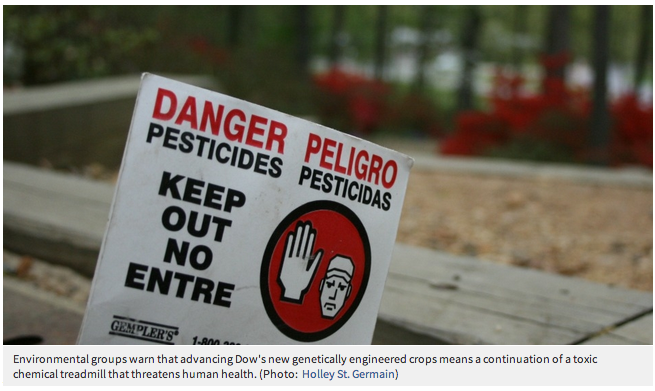‘Outrage’ Follows USDA’s Advancement of New Genetically Engineered Crops
Andrea Germanos
CommonDreams
Watchdog groups are denouncing the U.S. Department of Agriculture’srecommendation on Wednesday to approve new varieties of genetically engineered corn and soybeans as a path towards more toxic pesticides that threaten the environment and public health.
“We are outraged,” stated Marcia Ishii-Eiteman, PhD, senior scientist with Pesticide Action Network, adding that the “USDA has turned its back on America’s farmers and rural communities.”
The new crops are Dow AgroScience’s 2,4-D- and glyphosate-tolerant corn and soybeans. They are made to be used with Dow’s Enlist Duo herbicide, which contains 2,4-D and glyphosate and is also under review by the USDA.
The decision to advance the crops towards full deregulation flies in face of warnings by food and environmental groups, doctors, scientists, 50 members of Congress, as well as thousands of public comments to the USDA.
The calls not to green-light the crops focus on the dangers of 2,4-D, whose use the USDA admits will increase at least three-fold with the Enlist package.
Writing at Environmental Working Group’s (EWG) AgMag blog, Mary Ellen Kustin and Soren Rundquist detail the group’s analysis showing that over 5,600 American schools are within 200 feet from a field where 2,4-D could be sprayed if the Enlist Duo package is fully approved, a particularly noteworthy finding as 2,4-D has been linked to Parkinson’s, non-Hodgkin’s lymphoma, cancer and other health problems.
Further, Dow’s strategy of using additional pesticides to tackle the problem of so-called superweeds—like Roundup-resistant weeds—continues a profitable “pesticide treadmill.”
“Weed resistance is a major problem for farmers and we need a solution. This decision shows that the only options USDA is willing to consider are ones that lead to increased profits for chemical companies. We need to get off the pesticide treadmill, not increase the speed,” George Naylor, Center for Food Safety Board Member and Iowa corn and soybean farmer, said in a statement.
Genna Reed, a researcher with Food & Water Watch, adds that “the unfair reality is that the weed resistance explosion and increased spraying of 2,4-D that will occur once these crops are approved will have the greatest effect on those farmers who aren’t even growing GMOs or using 2,4-D.”
In the 30-day public comment period that remains before the USDA can give final approval, groups including the Center for Food Safety and Food & Water Watch are encouraging people to weigh in with their comments to the USDA.
